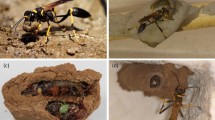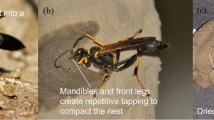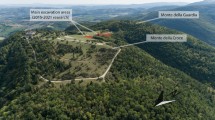Abstract
IN a study of the utilization of mud by mud-dauber wasps, kiln-firing has been investigated as a technique for quick identification of the mud sources used by the wasps. Sceliphron cementarium (Drury) has been found to construct nests using radioactive mud from the waste disposal pits on the Atomic Energy Reservation at the Oak Ridge National Laboratory. Trypoxylon politum (Say) seldom used radioactive mud, although it nested in the same sites as Sceliphron1. Information about the kinds of mud used, and the sources of such muds, was necessary for interpreting the behaviour of the wasps in this unique situation.
This is a preview of subscription content, access via your institution
Access options
Subscribe to this journal
Receive 51 print issues and online access
$199.00 per year
only $3.90 per issue
Buy this article
- Purchase on Springer Link
- Instant access to full article PDF
Prices may be subject to local taxes which are calculated during checkout
Similar content being viewed by others
References
Shinn, A. F., Health Physics, 10, 619 (1964).
Bartram, J., Phil. Trans. Roy. Soc., London, 43, 363 (1746).
Buckman, H., and Brady, N. C., The Nature and Properties of Soil (The Macmillan Co., New York, 1960).
Author information
Authors and Affiliations
Rights and permissions
About this article
Cite this article
SHINN, A. Kiln-firing as a Technique for studying Nest-building Behaviour of Mud-dauber Wasps. Nature 210, 112–113 (1966). https://doi.org/10.1038/210112a0
Issue Date:
DOI: https://doi.org/10.1038/210112a0
Comments
By submitting a comment you agree to abide by our Terms and Community Guidelines. If you find something abusive or that does not comply with our terms or guidelines please flag it as inappropriate.



